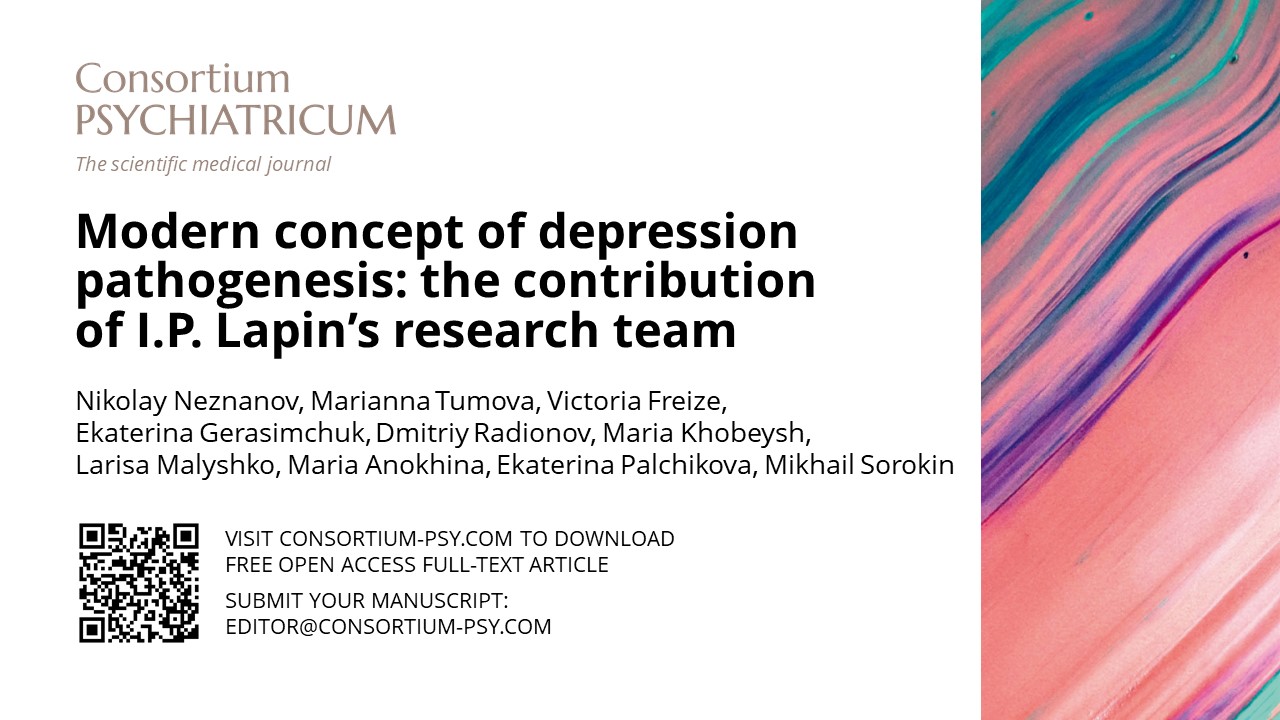
Anniversary of Experimental Substantiation and Series of Publications on the Role of Serotonin in Depression, Organised by Izyaslav Lapin
- Постерная сессия Совета молодых учёных в рамках конференции , посвященной 90-летию со дня рождения Б.Д. Карвасарского: «Альянс психологии, психотерапии и фармакотерапии. Наука и реальный мир в лечении психических расстройств»
- Anniversary of Experimental Substantiation and Series of Publications on the Role of Serotonin in Depression, Organised by Izyaslav Lapin
Anniversary of Experimental Substantiation and Series of Publications on the Role of Serotonin in Depression, Organised by Izyaslav Lapin
Юбилей эксперимента и серии научных публикаций о роли серотонина в развитии депрессии, организованных Изяславом Лапиным
Materials were prepared in support of the Federation of European Neuroscience Societies (FENS). History of Neuroscience Online Projects 2021 – to create a virtual public platform for hosting autobiographies, videos, pictures and other electronic materials relating to renowned neuroscientists and their work



IzyaslavPetrovich Lapin (1930—2012) was a distinguished Soviet scientist, psychopharmacologist, and professor in the field of medicine.
Biography and Professional Achievements
IzyaslavPetrovich Lapin (June 26, 1930 – August 25, 2012) was born in Leningrad, into a family of a construction engineer. Tragically, he lost his father at a young age, and he was raised by his caring mother and aunt, with whom he shared a close bond. Lapin remained their devoted caregiver until the end of their lives. He endured the challenging Siege of Leningrad during World War II, an experience that left a deep mark on him, and he took pride in being a veteran of the war. During his school years, he had a keen interest in music and chessand actively participated in competitions, showcasing his talents in these areas.
After completing his secondary education, Lapin enrolled at the 1st Leningrad Medical Institute, now known as the First Pavlov State Medical University of St. Petersburg. His decision to pursue a medical career was somewhat serendipitous. On the very last day of the application period, July 31, 1947, Lapin made a life-changing choice influenced by the movie “In the Name of Life.”This film portrayed the inspiring journey of two young doctors who conducted experimental surgeries on rabbits, aiming to repair damaged nerves in a little girl with paralyzed legs.
In a heartwarming climax, the dedicated doctors managed to perform a medical miracle by saving the young patient. Witnessing this remarkable story deeply moved I.P. Lapin, leading him to withdraw his application from the historical faculty of the university and set his course to become a doctor.
From the first year of his studies, I.P. Lapin showed an interest in science and was drawn not so much to theoretical knowledge as to experimental methods and discoveries. “Printed, bookish, paper – it was not so appealing; I was always drawn to the ‘living world,’ where specific problems were solved in experiments,” the scientist recalled. He started his scientific path at the Scientific Research Institute under the guidance of Professor Dmitry GeorgievichKvasov, and was introduced to Leon AbgarovichOrbeli, whom he later worked with and considered his mentor. In the laboratory of the 1st Leningrad Medical Institute, I.P. Lapin joined a working group studying the physiology of hearing.
Upon completing his undergraduate studies with distinction, IzyaslavPetrovich Lapin pursued admission to the postgraduate program at the Institute of Experimental Medicine of the Academy of Medical Sciences. Despite achieving exceptional scores on his entrance exams, his application was declined due to a prior recommendation for him to assume the role of head of the therapeutic department in Kronstadt, a position he had accepted several months before applying. Unfortunately, due to bureaucratic complications, Lapin not only lost his opportunity in the therapeutic department but also faced obstacles in other departments within the institute.Nevertheless, a few months later, Lapin enrolled in a PhD programme at the Department of Pharmacology at the Leningrad Pediatric Medical Institute, known today as St. Petersburg State Pediatric Medical University, under the guidance of V.M. Karasik. During his time at the Pediatric Institute, I.P. Lapin served on the state commission for several years, subsequently transitioning to a part-time teaching assistant position.While holding this role, he successfully completed his PhDtitled “The Mechanism of Inactivating Cyanides.” However, due to the relatively low salary associated with the assistant position, I.P. Lapin made the difficult decision to leave his position at the Pediatric Institute and instead began teaching pharmacology at the Paramedic College.
In due time, responding to a vacant tenure position for a psychopharmacologist, I.P. Lapin made a move to the “Psychoneurological Institute” (National Medical Research Center of Psychiatry and Neurology named after V.M. Bekhterev). On October 15, 1960, he assumed the role of head of the psychopharmacology laboratory, a position he held until 1993.
From 1990 to 1993, I.P. Lapin served as a Visiting Scientist at the invitation of the U.S. government at the National Institutes of Health. During this period, he not only conducted groundbreaking research but also shared his expertise with audiences worldwide.Lapin lectured extensively on psychopharmacology, addressing students, researchers, and clinical doctors in Russia, Italy, Germany, Israel, and the United States. Remarkably, he continued his experiments on the effects of kynurenines on animal behavior throughout this time.One notable highlight was his lecture series at the psychology department of Saint Petersburg State University, where he delved into the influence of various chemical compounds on the cognitive functions of healthy individuals.
Later in his career, I.P. Lapin entered into a collaboration with the P.F. Lesgaft Institute, where he extended medical and psychological support to athletes who were part of the national track and field team.
However, his dedication to the “Psychoneurological Institute” remained unwavering, and he actively participated in seminars hosted by the institute’s medical psychology laboratory for many years.As an honorary professor, I.P. Lapin continued to make significant contributions. He delivered lectures to medical interns, residents, postgraduates, and psychologists at the Educational Center of the V.M. Bekhterev National Medical Research Center for Psychiatry and Neurology in Saint Petersburg, a role he maintained until 2011.
I.P. Lapin’s remarkable journey came to an end on August 25, 2012, when his daughter discovered him upon her return from a business trip. A distinguished scientist, psychopharmacologist, medical doctor, and dedicated educator, I.P. Lapin breathed his last in his Saint Petersburg apartment, succumbing to cardiovascular disease. His legacy lives on through his contributions to the fields of science and medicine.
Scientific Legacy
During his tenure at the Psychopharmacology Laboratory of the V.M. Bekhterev National Medical Research Center for Psychiatry and Neurology, I.P. Lapin identified four primary areas of psychopharmacology research, each representing his core scientific pursuits.
The first area involved predicting the antidepressant effects of new active substances in patients by analyzing the outcomes of a battery of tests conducted on laboratory animals.. The frog (Rana temporaria) proved to be the most suitable for experiments, as it was the only species in which serotonin predominated among all biogenic substances. Changes in the activity of this monoamine in frogs were vividly demonstrated when antidepressants were applied.
The second research area was dedicated to the identification of serotonin as the brain’s central substance of interest. The objective of antidepressants is to bolster weakened serotonin processes, a concept that has proven to be successful. A significant milestone in this context was the publication of a pivotal review paper titled ‘Intensification of Central Serotoninergic Processes as a Possible Determinant of the Thymoleptic Effect’ in The Lancet in 1969. This review, which opened with the assertion that ‘Depression may result from a deficit of serotonin in the brain,’ provided substantial support for the serotonin hypothesis of depression development.This hypothesis, contrasting with the competing catecholamine hypothesis, has faced ongoing criticism but ultimately laid the groundwork for the development of one of the most commonly prescribed classes of drugs. These medications have expanded their clinical applications well beyond major depressive disorder, encompassing various anxiety disorders, premenstrual dysphoric disorder, certain eating disorders, and more. An example of this expansion is the discovery of the serotoninergic activity of drugs like trazodone, ethoperidone, and m-CPP in the 1970s.
The third area of research involved the discovery of the neuroactivity of essential amino acid metabolites, particularly tryptophan. I.P. Lapin was among the pioneers in his studies, uncovering the effects of kynurenine and its metabolites on brain function, as well as their peripheral impacts at various stages of development in animal models (4, 5, 6). His work encompassed the assessment of intracerebroventricular and intraperitoneal administration of kynurenine on rodents, both in developing and adult individuals.
Finally, the fourth research area centered on the psychology of pharmacotherapy. Collaborating with psychologists and psychiatrists for nearly three decades, I.P. Lapin delved into questions concerning the management of psychotropic drug effects in clinical contexts. Within this framework, he was among the pioneering researchers in the country to jointly explore placebo-related issues with Y.L. Nuller. Their investigations covered a wide range of topics related to placebo, including placebo reactivity, placebo control, and placebo therapy.
I.P. Lapin remained committed to these issues for many years, and they became the focal point of his final works. Notable among them are the books “Placebo and Therapy” and “Personality and Medicine: An Introduction to the Psychology of Pharmacotherapy.”
Concurrently and with significant productivity, the laboratory also pursued other research directions. For instance, as a practical outcome of pharmacological investigations into the effects of gamma-aminobutyric acid and its derivatives, the widely recognized drug phenibut was developed.
Awards and Honorary Titles
1971 – Elected as an active member of the New York Academy of Sciences.
1971 – Corresponding Member of the International Society of Biological Psychiatry.
1974 – Awarded the N.P. Kravkov Commemorative Medal for contribution to pharmacology development in the USSR.
1978 – Elected as a member of the American Academy of Arts and Sciences.
1966 – 1983 – Member of the Scientific Committee on research in psychopharmacology of the WHO and a member of the Psychopharmacology Committee of the World Psychiatric Association.
1984 – Honorary member of the British Association of Psychopharmacology.
Selected Bibliography:
Lapin IP, Oxenkrug GF. Intensification of the central serotoninergic processes as a possible determinant of the thymoleptic effect. Lancet. 1969. P. 132-1366.
Lapin IP. Depressor effect of kynurenine and its metabolites in rats. Life Sci. 1976 Nov 15;19(10):1479-83. doi: 10.1016/0024-3205(76)90091-6.
Lapin IP. Convulsions and tremor in immature rats after intraperitoneal injection of kynurenine and its metabolites. Pharmacol Res Commun. 1978 Jan;10(1):81-4. doi: 10.1016/s0031-6989(78)80065-4.
Lapin IP. Stimulant and convulsive effects of kynurenines injected into brain ventricles in mice. J Neural Transm. 1978;42(1):37-43. doi: 10.1007/BF01262727
Lapin IP. On the role of psychological experiments in pharmacological studies of psychotropic drugs // Abstracts of the 2nd Congress of Psychologists. L., 1963. P. 21–23.
Nuller YL, Lapin IP. Influence of drug information on the effectiveness of placebo and meprobamate // Clin. Med. 1971. No. 9. P. 139–144.
Lapin IP. Psychological aspects of the intake and prescription of drugs // Psychological problems of psychohygiene, psychoprophylaxis, and medical deontology (medical and psychological research). L.: Leningrad Scientific Research Psycho-Neurological Institute named after V.M. Bekhterev, 1976. P. 80–81.
Lapin IP. Psychology of relations between a doctor and a patient’s family during drug therapy // Psychology and Medicine (Symposium Materials). M.: Institute of Psychology, USSR Academy of Sciences, 1978. P. 262–264.
Rubitel AV, Nabokova AI, Lapin IP. Color of the drug and its expected psychotropic effect // Individualization and evaluation of the effectiveness of psychopharmacotherapy: Collection of scientific works of the Leningrad Scientific Research Psycho-Neurological Institute named after V.M. Bekhterev, 1987. Vol. 117. P. 49–54.
Lapin IP. Placebo effect and the practice of rehabilitation of mentally ill patients // Pharmacotherapeutic foundations of the rehabilitation of mentally ill patients / Ed. by R.Ya. Vovin, G-E. Kyune. M.: Medicine, 1989. P. 242–255.
Lapin IP, Rubitel AV. Diagnosis of negative placebo reactors and absolute placebo non-reactors based on the stability of color choice // The search for new drugs. Tartu: Publishing House of Tartu State University, 1989. P. 20–22.
Ablahatov YI, Lapin IP. Appearance of anxiety after taking placebo // Journal of Neuropathology and Psychiatry. 1989. Vol. 89. No. 12. P. 48–50.
Lapin IP. Placebo reactivity and color choice // Psychology Journal. 1990. Vol. 11. No. 3. P. 79–86.
Lapin IP. Psychological factors of pharmacotherapy // Clin. Med. 1990. No. 8. P. 17–23.
Lapin IP, Grinenko NI, Krupitsky EM et al. Is the individual characteristic of “placebo reactor” and “placebo non-reactor” stable? // Review of Psychiatry and Medical Psychology. 1994. No. 2. P. 105–108.
Ablahatov YI, Lapin IP. Instability and stability of color choice and placebo reactivity in mentally ill patients. Review of Psychiatry and Medical Psychology. 1994. No. 4. P. 80–83.
Lapin IP, Annalova NA. Psychology of pharmacotherapy // Kharkiv Medical Journal. 1997. No. 2. P. 54–58.
Lapin IP. Consent – a factor determining the communication between the patient and the doctor and the success of treatment (Review – 47 titles) // Clin. Med. 1999. Vol. 77. No. 11. P. 15–18.
Lapin IP, Annalova NA. Positive placebo effect in some mental and neurological disorders (Review – 73 titles) // Journal of Neurology and Psychiatry named after S.S. Korsakov. 1999. Vol. 99. No. 11. P. 55–59.
Lapin IP, Annalova NA. On the mechanisms of the placebo effect: Lecture // Experimental and Clinical Pharmacology. 1999. Vol. 62. No. 3. P. 75–79.
Lapin IP. Placebo and Therapy. Lan, St. Petersburg. 2000. P. 223.
Lapin IP. Personality and Medicine: An Introduction to the Psychology of Pharmacotherapy. Dean, St. Petersburg. 2001. P. 414.
Lapin IP. How to reduce psychological barriers in pharmacotherapy. An invitation to search // Psychiatry and Narcology in the 21st Century / Collection of scientific articles edited by A.G. Sofronov and A.Yu. Egorov). St. Petersburg. 2
008. P. 110–117.
Lapin IP. Patient attitude towards drug effects as a reason for refusing pharmacotherapy // Review of Psychiatry and Medical Psychology. 2012. No. 3. P. 112–115.
Notes:
1. In memory of Professor IzyaslavPetrovich Lapin. Accessed September 30, 2021. Archived September 30, 2021.
2. Lapin IP, Oxenkrug GF, Osipova SV, Uskova NV. The frog as a subject for screening thymoleptic drugs. J Pharm Pharmacol. 1970 Oct;22(10):781-2. doi: 10.1111/j.2042-7158.1970.tb08429.x
3. Fundamentals of psychopharmacology. Theory and practice / Steven M. Stahl; translation from English edited by D. Krinitsky. – Moscow: GEOTAR-Media, 2022
4. Lapin IP. Depressor effect of kynurenine and its metabolites in rats. Life Sci. 1976 Nov 15;19(10):1479-83. doi: 10.1016/0024-3205(76)90091-6.
5. Lapin IP. Convulsions and tremor in immature rats after intraperitoneal injection of kynurenine and its metabolites. Pharmacol Res Commun. 1978 Jan;10(1):81-4. doi: 10.1016/s0031-6989(78)80065-4.
6. Lapin IP. Stimulant and convulsive effects of kynurenines injected into brain ventricles in mice. J Neural Transm. 1978;42(1):37-43. doi: 10.1007/BF01262727
References:
– IzyaslavPetrovich Lapin – On the 75th anniversary of his birth
– Dedicated to the 85th anniversary of IzyaslavPetrovich Lapin

Professor Popov U.V. (past deputy -director V.M. Bekhterev National Medical Research Center for Psychiatry and Neurology)
Professor Kotsiubinskii A.P. (V.M. Bekhterev National Medical Research Center for Psychiatry and Neurology)
Neznanov, N. G., Tumova, M. A., Freize, V. V., Gerasimchuk, E. S., Radionov, D. S., Khobeysh, M. A., Malyshko, L. V., Anokhina, M. V., Palchikova, E. I., & Sorokin, M. Y. (2025). Modern concept of depression pathogenesis: the contribution of I.P. Lapin’s research team. Consortium PSYCHIATRICUM, 6(2), 77-84. doi: 10.17816/CP15601
